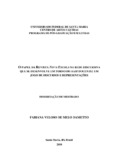| dc.creator | Dametto, Fabiana Veloso de Melo | |
| dc.date.accessioned | 2011-02-23 | |
| dc.date.available | 2011-02-23 | |
| dc.date.issued | 2010-11-30 | |
| dc.identifier.citation | DAMETTO, Fabiana Veloso de Melo. The role of nova escola magazine in the discursive net developed in teaching: a game of discourses and
representations. 2010. 152 f. Dissertação (Mestrado em Letras) - Universidade Federal de Santa Maria, Santa Maria, 2010. | por |
| dc.identifier.uri | http://repositorio.ufsm.br/handle/1/9836 | |
| dc.description.abstract | Expressions like school is in crisis , teachers have lost their authority , Teaching Undergraduation
is weak have been recurrent in texts approaching Brazilian education. It is also perceived a general
concern regarding the problem of teaching quality. Media has been playing an important role in this
social debate that aims to find the people guilty for Brazilian school system failure. Following this
movement, my attention has been drawn to a magazine cover article, published by Nova Escola magazine in October 2009, approaching the topic of school indiscipline. The choice for this text occurred due to three aspects: the publication is mainly for educators; the magazine is nationally distributed; and also because it has been in the market for 25 years. Thus, I aim to investigate the role of Nova Escola magazine in the teaching act, since there are many instances directed to the teacher, among them official documents and textbooks. I hope to bring up the discussion of the role of the media in the (dis)construction of the teaching representation. In a general way, the procedures used in the research are fundamentally from the theoretical and methodological board of the Socio-Discursive Interactionism, based on the studies of Jean-Paul Bronckart, and on the Theory of the Social
Representations, proposed by Serge Moscovici. The analysis on the role of the magazine and the referred article leads to a representation of the current teaching process as wrong, and Nova Escola as the helping hand for the teacher, the one that holds the knowledge, that paves the path. Such characteristic brings into memory the relationship between teachers and textbooks. Considering this discourse, there is also a denial of the current teaching work, placing the discourse close to the one in
official documents (PCNs, PDE, and GESTAR). | eng |
| dc.description.sponsorship | Coordenação de Aperfeiçoamento de Pessoal de Nível Superior | |
| dc.format | application/pdf | por |
| dc.language | por | por |
| dc.publisher | Universidade Federal de Santa Maria | por |
| dc.rights | Acesso Aberto | por |
| dc.subject | Interacionismo sociodiscursivo | por |
| dc.subject | Representação social | por |
| dc.subject | Agir docente | por |
| dc.subject | Revista Nova Escola | por |
| dc.subject | Socio-discursive interactionism | eng |
| dc.subject | Social representation | eng |
| dc.subject | Teaching act | eng |
| dc.subject | Nova Escola Magazine | eng |
| dc.title | O papel da revista nova escola na rede discursiva que se desenvolve em torno do agir docente: um jogo de discursos e representações | por |
| dc.title.alternative | The role of nova escola magazine in the discursive net developed in teaching: a game of discourses and
representations | eng |
| dc.type | Dissertação | por |
| dc.description.resumo | Expressões como a escola está em crise , os professores perderam a autoridade , os cursos de licenciatura são fracos têm sido recorrentes em textos que abordam a educação brasileira. Percebe-se, também, uma preocupação geral em torno da problemática da qualidade do ensino, e a mídia tem desempenhado um papel de destaque nesse debate social que busca encontrar os culpados pelo fracasso escolar brasileiro. Acompanhando esse movimento, chamou-me a atenção uma reportagem de capa da Revista Nova Escola, publicada em outubro de 2009, que traz como tema a indisciplina na escola. A escolha desse texto deve-se a três aspectos: a publicação destinar-se ao educador, por
circular em todo o país e pela Revista estar no mercado há quase 25 anos. Sendo assim, proponho-me a investigar o papel da Revista Nova Escola na rede discursiva que se desenvolve em torno do agir docente, pois muitas são as instâncias que se dirigem diretamente ao professor, entre elas estão os documentos oficiais e os livros didáticos. Espero, com isso, trazer à tona a discussão acerca do papel
dessa publicação na (des)construção da representação do trabalho docente. De modo geral, os procedimentos utilizados na pesquisa provêm, fundamentalmente, do quadro teórico-metodológico do Interacionismo Sociodiscursivo, pautado nos escritos de Jean-Paul Bronckart, e na Teoria das Representações Sociais, proposta por Serge Moscovici. A análise do perfil de atuação da Revista e da referida reportagem aponta para uma representação do agir docente atual como equivocado, e a Nova Escola como aquela que vem ao auxílio do professor, a conhecedora, a que traz facilidades. Tal característica lembra a relação já vivida entre professores e livros didáticos. Além disso, há também
uma negação do trabalho docente atual, o que aproxima o seu discurso ao dos documentos oficiais (PCN s, PDE e GESTAR). | por |
| dc.contributor.advisor1 | Corrêa, Marcia Cristina | |
| dc.contributor.advisor1Lattes | http://lattes.cnpq.br/4758168670271026 | por |
| dc.contributor.referee1 | Angelo, Graziela Lucci de | |
| dc.contributor.referee1Lattes | http://lattes.cnpq.br/9609852805557412 | por |
| dc.contributor.referee2 | Guimarães, Ana Maria de Mattos | |
| dc.contributor.referee2Lattes | http://lattes.cnpq.br/4439407429779665 | por |
| dc.creator.Lattes | http://lattes.cnpq.br/3180565305645241 | por |
| dc.publisher.country | BR | por |
| dc.publisher.department | Letras | por |
| dc.publisher.initials | UFSM | por |
| dc.publisher.program | Programa de Pós-Graduação em Letras | por |
| dc.subject.cnpq | CNPQ::LINGUISTICA, LETRAS E ARTES::LETRAS | por |


